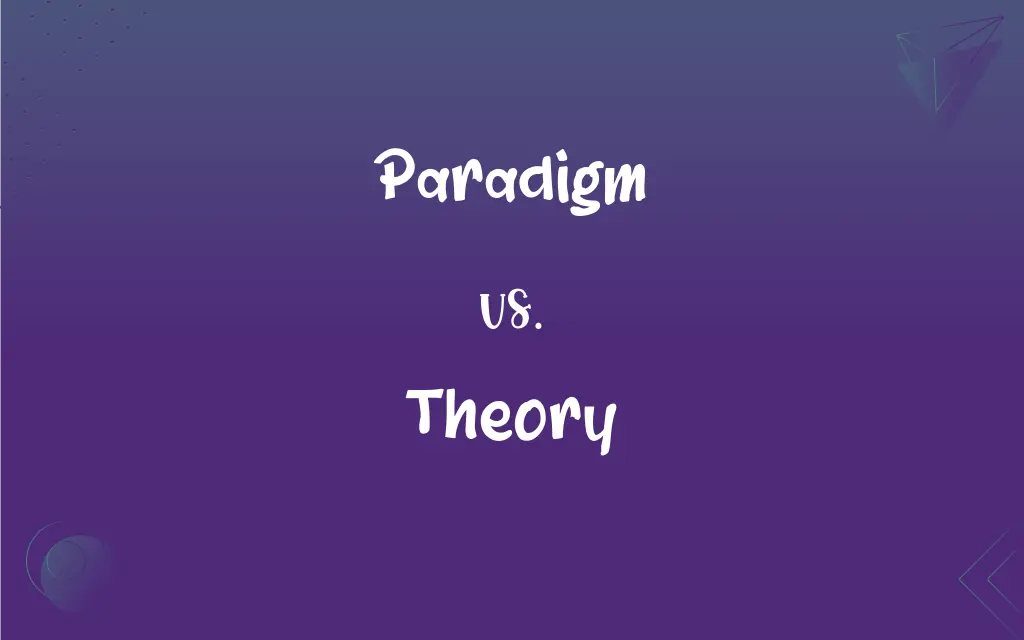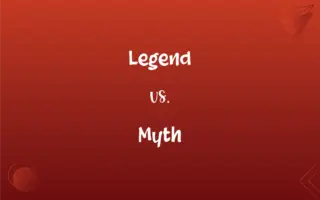Paradigm vs. Theory: What's the Difference?
Edited by Janet White || By Harlon Moss || Updated on October 23, 2023
A paradigm is a framework or model guiding beliefs and practices, while a theory is a tested explanation or hypothesis about a phenomenon.

Key Differences
A paradigm encompasses a broad understanding that informs our perspective in a given field. It is a set of beliefs, values, or practices that make up the way we view the world, often unconsciously. A theory, on the other hand, is more specific. It provides a structured explanation or hypothesis about a certain phenomenon based on observations and evidence.
Paradigms influence how we approach problems and seek solutions. They shape the methods we use, the questions we ask, and the answers we consider valid. Theories, conversely, are the results of these methods and approaches, providing explanations that can be tested, validated, or refuted.
It is possible for multiple theories to exist within a single paradigm. The paradigm provides the overarching structure, guiding the formulation and validation of theories. As research progresses, theories might evolve, be replaced, or be disproven, but the paradigm typically remains stable until a significant shift in understanding occurs.
When such a significant shift in perspective happens, it's often referred to as a "paradigm shift." This term implies a fundamental change in the foundational concepts within a field. In contrast, when a theory is disproven or replaced, it doesn't necessarily indicate a shift in the broader paradigm.
In essence, while paradigms act as broad lenses shaping our view and approach to the world, theories serve as tools within these paradigms, offering specific explanations and predictions about certain aspects of that world.
ADVERTISEMENT
Comparison Chart
Definition
A model or framework guiding beliefs and practices
A tested explanation or hypothesis about a phenomenon
Scope
Broader
More specific
Stability
Generally stable, changes result in paradigm shifts
Can change frequently based on new evidence
Relation to evidence
Framework for interpreting evidence
Directly based on evidence
Number within a field
Typically one dominant paradigm at a time
Multiple theories can exist within a paradigm
ADVERTISEMENT
Paradigm and Theory Definitions
Paradigm
A paradigm is a dominant model or pattern in a particular field.
The heliocentric model was a paradigm shift in astronomy.
Theory
Theories are based on a hypothesis and are backed by evidence.
Darwin's theory of evolution is supported by fossil records.
Paradigm
A paradigm can be an example that serves as a model or pattern.
Her approach to the problem became the paradigm for future research.
Theory
A theory can provide predictions about future events or phenomena.
Quantum theory predicts behaviors at the subatomic level.
Paradigm
Paradigm refers to a set of beliefs or practices governing an area of activity.
The digital revolution created a new paradigm in communication.
Theory
A theory is a well-substantiated explanation of some aspect of the natural world.
Einstein's theory of relativity changed our understanding of time and space.
Paradigm
Paradigms often underlie and inform theoretical frameworks.
The quantum paradigm challenges our classical understanding of physics.
Theory
Theories can be tested and refined based on new evidence.
The string theory is still undergoing refinement and testing.
Paradigm
A paradigm shift is a fundamental change in approach or underlying assumptions.
Introducing relativity caused a paradigm shift in the world of physics.
Theory
In common usage, theory can refer to a speculation or guess.
I have a theory about why he's always late to meetings.
Paradigm
One that serves as a pattern or model.
Theory
A set of statements or principles devised to explain a group of facts or phenomena, especially one that has been repeatedly tested or is widely accepted and can be used to make predictions about natural phenomena.
FAQs
Can theories exist across different paradigms?
Typically, theories are formulated within the confines of a specific paradigm.
What is a paradigm shift?
A paradigm shift is a fundamental change in the foundational concepts or beliefs within a field.
What is a paradigm?
A paradigm is a framework or model guiding beliefs and practices in a particular field.
How does a theory differ from a hypothesis?
A theory is a tested and substantiated explanation, while a hypothesis is an untested proposition or prediction.
Is a theory always correct?
No, theories can be disproven or refined based on new evidence or findings.
Do paradigms exist only in science?
No, paradigms exist in various fields, from art to philosophy to business.
How is a theory validated?
A theory is validated through testing, evidence gathering, and peer review.
How do theories evolve?
Theories evolve based on new research, evidence, and understanding.
Why might a theory be rejected?
A theory might be rejected due to insufficient evidence or if newer evidence contradicts it.
Do all scientists agree on a particular theory?
No, scientific theories can be subjects of debate and disagreement among scientists.
Can paradigms and theories coexist?
Yes, paradigms provide the broader framework within which theories operate.
Why are paradigms important?
Paradigms shape how we view, understand, and approach problems in a specific field.
Can multiple theories exist within one paradigm?
Yes, multiple theories can operate within the framework of a single paradigm.
Can a theory exist without a paradigm?
Typically, theories are developed within the context of a paradigm, which provides the foundational framework.
Is every paradigm shift revolutionary?
While many paradigm shifts are revolutionary, the degree of change can vary.
How are new theories formed?
New theories emerge from observations, research, hypotheses, and the testing of these hypotheses.
What causes a paradigm to change?
New discoveries, innovations, or shifts in understanding can lead to changes in a paradigm.
Are paradigms always based on facts?
Paradigms are based on prevailing beliefs and practices, which may or may not be factual.
Is every paradigm universally accepted?
No, different paradigms can coexist, especially across different cultures or disciplines.
Can a paradigm change without a paradigm shift?
Minor adjustments might occur, but fundamental changes in a paradigm are termed as "paradigm shifts."
About Author
Written by
Harlon MossHarlon is a seasoned quality moderator and accomplished content writer for Difference Wiki. An alumnus of the prestigious University of California, he earned his degree in Computer Science. Leveraging his academic background, Harlon brings a meticulous and informed perspective to his work, ensuring content accuracy and excellence.
Edited by
Janet WhiteJanet White has been an esteemed writer and blogger for Difference Wiki. Holding a Master's degree in Science and Medical Journalism from the prestigious Boston University, she has consistently demonstrated her expertise and passion for her field. When she's not immersed in her work, Janet relishes her time exercising, delving into a good book, and cherishing moments with friends and family.































































